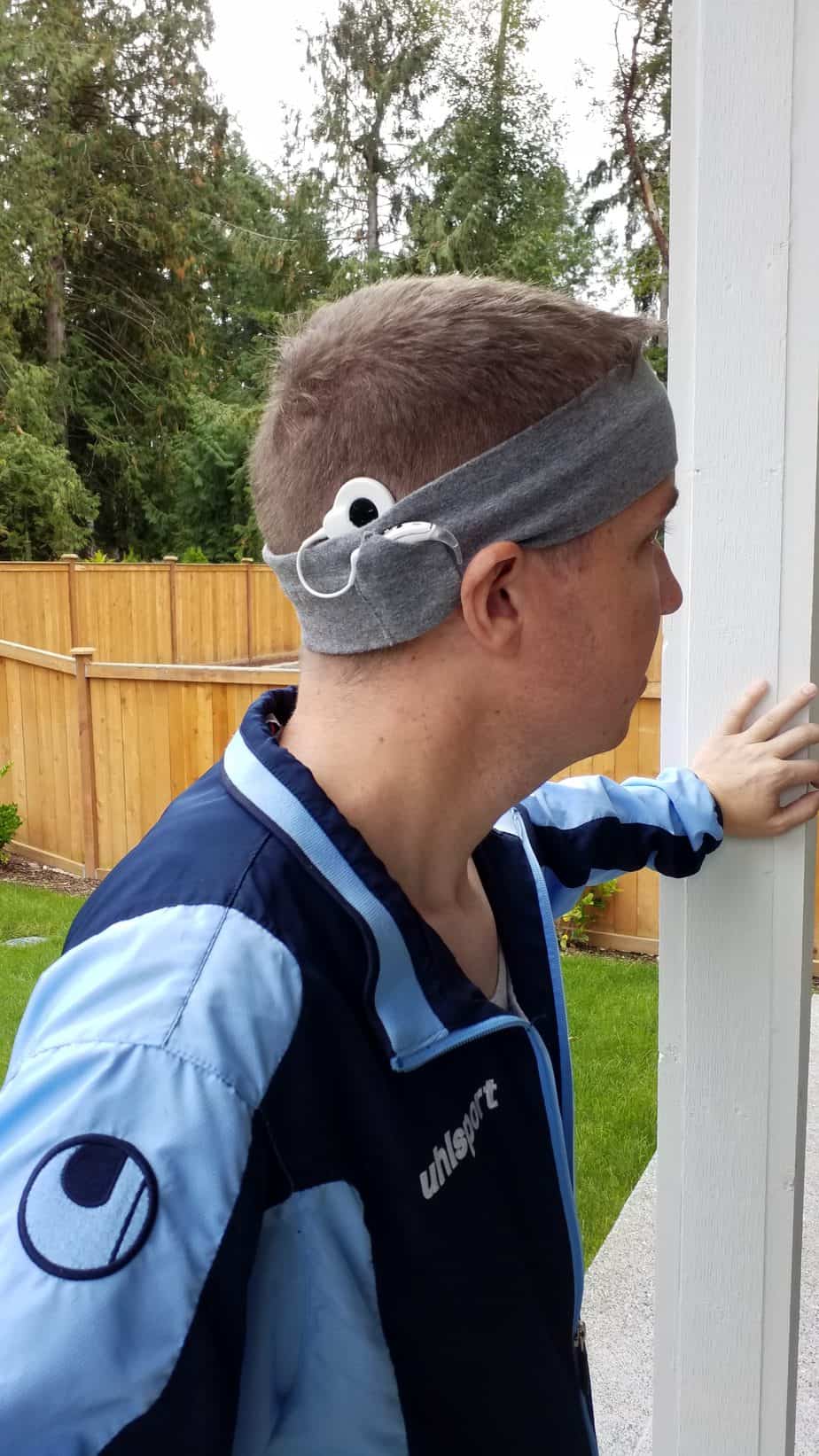Dietrich H. had hearing loss since he was a baby and wore hearing aids for many years. When he was 35, he started noticing difficulty hearing in most settings. After becoming a cochlear implant candidate, he found the Cochlear™ Nucleus® 7 Sound Processor and now is impressed with the clarity of sound his cochlear implants provide. See how his cochlear implants are aiding in his hobby of Capoeira martial arts:
“My hearing loss story began at birth with a bilateral sensorineural loss. My hearing loss was attributed to a genetic condition, although I do not know of anybody else in my family tree with hearing loss other than hearing loss related to old age. The loss over the years in both ears was gradual.
The data from my first audiogram taken in 1986, at 3 years old, shows that I was still able to hear in the ‘speech banana’ and I had normal speech development. My first amplification device was an easy listener FM system that I used in school with my teachers at age 6. After, I got my first analogue behind-the-ear hearing aids at age 8. I wore hearing aids for 27 years until I had lost so much volume and clarity that I was having great difficulty in almost every setting.
Hearing aid struggles
 There was one moment in 2018 when my hearing aids were in the shop for a few days, and I could not hear one of my coworkers talking to me face to face in a quiet office setting. I saw lips moving, but virtually no sound! I had to have another coworker relay the information to me via email. I realized that even with hearing aids, I was relying on lip-reading about 80 percent of the time.
There was one moment in 2018 when my hearing aids were in the shop for a few days, and I could not hear one of my coworkers talking to me face to face in a quiet office setting. I saw lips moving, but virtually no sound! I had to have another coworker relay the information to me via email. I realized that even with hearing aids, I was relying on lip-reading about 80 percent of the time.
In January 2019, at age 35, I went in to see my audiologist with the idea of getting a new pair of hearing aids, knowing that the results would still be only marginally better than what I had. After that hearing test, she mentioned that I might be a cochlear implant candidate due to my low speech comprehension scores.
Shocked by cochlear implant candidacy
At first, I was surprised, not having any idea about what was available on the market and only having a vague recollection of cochlear implants from the 80s and 90s. But I put off my hearing aid purchase and did some research. Not long after that, I had my first cochlear implant candidacy test and got to see the latest cochlear implant products from three different manufacturers.
The Nucleus 7 Sound Processor was an easy choice. Cochlear has the smallest and lightest1 sound processors that are Bluetooth® compatible, and there is a Nucleus Smart App2 that can control all the settings. I also liked the important accessories such as rechargeable batteries and the Aqua+3 waterproof kit that I use for exercising and swimming.
I chose to get bilateral cochlear implants done at the same time because I was confident in the technology, and I knew that I did not have enough comprehension to warrant the continued use of a hearing aid in one ear or the other. My surgery was on April 4, 2019, and my activation happened weeks later. I chronicled my whole journey in a video series that I have posted on YouTube.
Clarity in sound cochlear implants provide
 I could understand speech at my activation session, but the clarity took a few weeks. At first, I could not tell who was talking, only whether it was male or female. Each time I visited my wonderful audiologist, we increased the range of my sound processors as well as the Maxima (number of electrodes that can be active at any given time) and each time, clarity and speech came more and more into focus like I never could have hoped!
I could understand speech at my activation session, but the clarity took a few weeks. At first, I could not tell who was talking, only whether it was male or female. Each time I visited my wonderful audiologist, we increased the range of my sound processors as well as the Maxima (number of electrodes that can be active at any given time) and each time, clarity and speech came more and more into focus like I never could have hoped!
Before my cochlear implantation, I was depressed and forlorn. Hearing loss had begun to affect my social life, and I was very concerned about my future as a structural engineering drafter…whether I would be able to continue functioning in that role as part of a professional team was questionable. Now, I can participate in group discussions, hear speakers during business meetings without lip-reading and hear on the phone. I am an Android™ user and can now stream directly to my sound processors!
I feel that getting cochlear implants was one of the best decisions of my life (second only to becoming a person of faith in God,) and both have opened up a world of possibilities for a positive future.
My hobby: Capoeira martial arts
One of my favorite hobbies over the past seven years has been Capoeira Martial Arts. It’s a Brazilian form of acrobatic dance-fighting accompanied by live percussion music and singing. I have a renewed interest in the sport now that I can hear all of the instruments and lyrics. I used to play without my hearing aids in because they were not sweat-resistant, so I would hear very little of the instruction and only the beat of the drums. Now I wear my processors in the Aqua+ kit with a cochlear implant headband to hold them in place. Now, I have to remind my teammates not to yell at me, as they were accustomed to doing when I was practically deaf.
I have started taking vocal lessons with a professional voice trainer to practice hitting the correct pitches when I am singing in Capoeira and to help me evaluate how I am sounding to others compared to myself as I adjust to the cochlear implants. I am becoming involved in the hearing loss community as a Cochlear Volunteer and advocate. Please feel free to reach out to me if you are a candidate, have questions about my journey, or want to share your own story!
All the best in life to you!”
Are you struggling in hearing aids? Interested in learning about the clarity of sound cochlear implants can provide? Discover more today.
4 5 6- Cochlear Limited. D1190805. CP1000 Processor Size Comparison. 2019, Apr; Data on file.
- For information on sound processor and app compatibility, visit www.cochlear.com/compatibility
- The Nucleus 7 Sound Processor with Aqua+ is water resistant to level IP68 of the International Standard IEC60529. This water protection rating means that the sound processor with the Aqua+ can be continuously submerged under water to a depth of 3 m (9 ft and 9 in) for up to 2 hours. This water protection only applies when you use a Cochlear Standard Rechargeable Battery Module or Cochlear Compact Rechargeable Battery Module.
- The Bluetooth® word mark and logos are registered trademarks owned by Bluetooth SIG, Inc. and any use of such marks by Cochlear is under license.
- Android is a trademark of Google LLC.
- For a list of FDA approved indications, please refer to the physician’s guide.